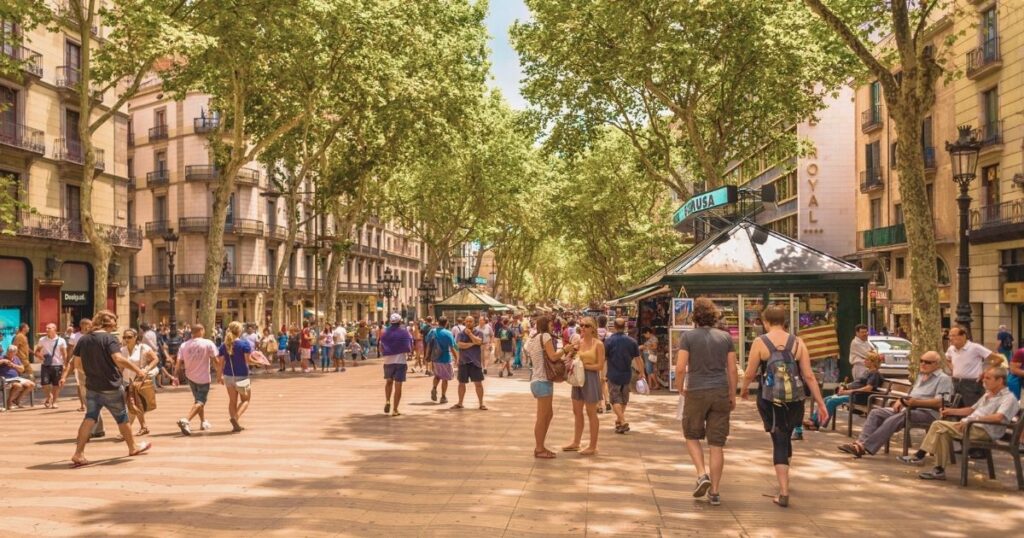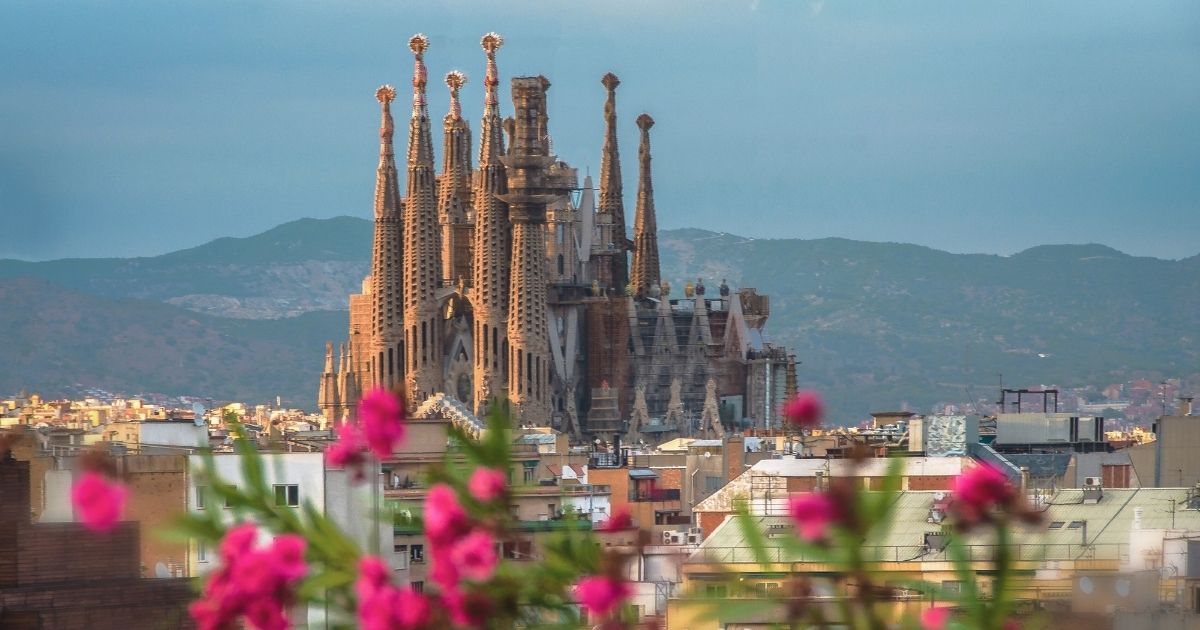Barcelona’s language scene reflects its unique culture and rich history. Naturally, visitors often ask: what language do people speak in Barcelona? Although the answer is simple, it also has some details. Specifically, Barcelona officially uses two languages: Catalan and Spanish (Castilian). However, the reality is more complex, as other languages and cultural influences shape the city’s communication.
Therefore, knowing about the languages in Barcelona helps visitors get around more easily and enjoy the culture better. In this guide, we explain the languages spoken in Barcelona, where they are used, and also share useful language tips for travelers and digital nomads.
The primary languages: Catalan and Spanish

Barcelona is the capital of Catalonia, an autonomous region with its own language tradition. As a result, when asking what language people speak in Barcelona, it’s important to first understand the relationship between the two official languages. In fact, this relationship shapes much of the city’s cultural and linguistic life.
Catalan: the regional language
Catalan is the historic language of Catalonia and a key part of the region’s identity. Contrary to what some visitors might think, Catalan is not a Spanish dialect. In fact, it is a separate Romance language with its own grammar, vocabulary, and pronunciation. Moreover, it developed independently from Spanish and shares more similarities with Occitan and French than with Castilian Spanish.
Today in Barcelona, Catalan is used as:
- The main language of regional government
- The primary language in public schools
- The usual language for local media and public signs
- A symbol of cultural identity and regional independence
Recent studies show that about 75% of people in Barcelona understand Catalan, and around 55-60% speak it regularly. Furthermore, its use is more common in work and government settings, education, and among families with strong local ties in the region. Catalonia.
💡 Did you know? Catalan was suppressed during Franco’s dictatorship (1939-1975), with public use prohibited and speakers persecuted. Since Spain’s transition to democracy, Catalonia has implemented policies to revitalize the language, making it one of the most successful language revival stories in Europe.
Spanish (Castilian): the national language
When visitors ask what language is spoken in Barcelona, Spanish (officially called Castilian in Spain) must also be part of the answer. As Spain’s national language, Spanish is spoken throughout Barcelona. In fact, all residents speak Spanish, even if their level of Catalan varies.
In Barcelona, Spanish functions as:
- A language everyone understands
- The main way to communicate with visitors
- The usual language in many service jobs
- The preferred language in many social settings
Many people in Barcelona, especially younger ones, switch easily between Catalan and Spanish depending on the situation. Moreover, this switching happens so naturally that visitors might not even notice when the language changes.
🌟 Pro tip: when wondering what language do they speak in Barcelona businesses, the answer often depends on the neighborhood and type of establishment. Tourist-oriented businesses in central areas predominantly use Spanish and English, while neighborhood establishments in residential areas might default to Catalan, especially in conversations among staff.
Language politics and identity in Barcelona

The question of what language do they speak in Barcelona carries political dimensions that reflect broader debates about regional autonomy and national identity.
The linguistic context of Catalan identity
Language in Barcelona is more than just a way to communicate—it also shows cultural heritage and political views. Specifically, the region promotes Catalan through rules about education and public signs, thereby reflecting its effort to keep its unique identity within Spain.
For visitors, knowing this therefore helps explain why language choice can feel important in Barcelona. For example, at public events and official ceremonies, you’ll often hear Catalan first, as a symbol of the region’s cultural independence.
Some locals see speaking Catalan as a way to show pride in their region, while others highlight the practical advantages of Spanish, which is spoken by hundreds of millions worldwide.
Nevertheless, most people in Barcelona handle this language mix practically, using whichever language fits best in each situation, without focusing on politics.
The changing multilingual scene
Barcelona’s language situation keeps changing because of immigration, tourism, and global influences. Therefore, when you ask what language people speak in Barcelona today, the full answer includes the city’s growing mix of languages.
Besides Catalan and Spanish, you’ll find:
- Increasing use of English, especially in business, tech, and tourism
- Large communities speaking Arabic, French, Italian, Russian, Chinese, Urdu, and various Latin American Spanish dialects
- International workplaces where many languages are spoken
Overall, this mix of languages makes Barcelona more global and helps connect its many communities.
💡 Did you know? Barcelona hosts numerous language exchange events where locals and foreigners practice languages together. These “intercambios” offer visitors opportunities to improve their Spanish or Catalan while helping locals practice other languages.
Language tips for visitors to Barcelona

For travelers wondering what language do they speak in Barcelona establishments they’ll visit, here are practical guidelines to navigate the linguistic landscape.
Essential language knowledge for tourists
Most short-term visitors to Barcelona can get around easily using basic Spanish phrases because nearly everyone speaks Spanish well. However, English skills vary but are usually good in:
- Tourist spots and popular attractions
- Hotels and international restaurants
- Upscale shopping areas
- Among younger locals
Meanwhile, using simple polite phrases in Catalan is appreciated by residents, though it’s not required for visitors. For example, simple greetings like “Bon dia” (Good morning) or “Gràcies” (Thank you) often make a positive impression. Such greetings can generate goodwill and show respect for local culture.
🌟 Pro tip: if you speak another Romance language like French, Italian, or Portuguese, you might find it easier to understand written Catalan than spoken Catalan. Restaurant menus, street signs, and other public information in Catalan often contain recognizable cognates from other Latin-based languages.
Digital language solutions for Barcelona
When thinking about what language they speak in Barcelona businesses you plan to visit, digital tools can help bridge communication gaps. In fact, modern translation apps have greatly improved the visitor experience, making language barriers less of a problem than in the past.
To improve your language skills during your Barcelona trip, consider:
- Downloading offline Spanish and Catalan language packs for Google Translate or similar apps
- Installing a Spanish keyboard on your phone
- Preparing a few key phrases translated for common situations
For digital nomads or longer stays, having constant internet access is crucial to keep these translation tools handy. Getting a reliable Barcelona-ready eSIM before you arrive ensures you’ll have data from the moment you land, helping you avoid communication problems in those first important days.
Language learning opportunities in Barcelona

For visitors interested in language acquisition, Barcelona offers excellent opportunities to learn both Spanish and Catalan.
Spanish language learning in Barcelona
Barcelona offers many language schools where you can take Spanish courses, from intensive immersion programs to casual conversation classes. Although the Spanish spoken in Barcelona has a slightly different accent than the Castilian taught in formal courses, the city is a great place to improve your Spanish skills.
If you wonder what language they speak in Barcelona’s language schools, most Spanish courses use the standard Castilian form. However, teachers usually understand Catalan and can explain local language differences.
Benefits of learning Spanish in Barcelona include:
- Exposure to everyday Spanish in a lively city setting
- Chances to practice with friendly locals who are used to language learners
- Access to cultural activities that help improve your skills
- Learning a global language spoken by over 500 million people
Since Barcelona is an international hub, many schools offer specialized Spanish courses for different fields such as business, medicine, and technology.
Catalan language resources
For visitors planning longer stays, basic Catalan lessons might be worth considering. The Catalan government supports free beginner Catalan courses through the Consorci per a la Normalització Lingüística, showing their commitment to promoting the language.
When asking what language they speak in Barcelona government offices, you’ll find that although both Spanish and Catalan are official, Catalan often dominates public administration. So, knowing some basic Catalan vocabulary is useful if you need to handle local paperwork.
While tourists rarely need Catalan for everyday purposes, learning some can benefit:
- Digital nomads staying for longer periods
- People working with local organizations
- Visitors wanting to connect more deeply with the culture
- Those thinking about moving to Barcelona
Even a little Catalan shows respect for the local culture and often brings positive reactions from locals.
Final thoughts: navigating Barcelona’s linguistic landscape
When considering what language they speak in Barcelona, it’s important to remember that the city’s bilingualism reflects cultural richness rather than a communication barrier. Most residents switch effortlessly between languages and appreciate any effort visitors make, whether in Spanish or Catalan.
Due to Barcelona’s growing international character, English often serves as a useful backup—especially in central areas and among younger people. However, learning some basic Spanish phrases can greatly improve your experience, allowing more genuine interactions beyond the usual tourist spots.
Barcelona’s language scene mirrors its unique role as both a proud Catalan capital and a cosmopolitan Mediterranean city. Instead of seeing this as a complication, visitors can embrace it as part of the city’s charm—a lively blend of regional traditions and global influences that creates a rich multilingual environment.
For digital nomads thinking about Barcelona as a base, this linguistic diversity offers great benefits, including chances to learn Spanish while immersing in Catalan culture. To make your remote work life easier, check out our guide on finding the perfect apartment in Barcelona, with tips on neighborhoods and connectivity.
Ready to dive into Barcelona’s vibrant linguistic culture? Let Nomada help you explore this bilingual city and enjoy a smooth nomadic adventure 🌍
Frequently asked questions about languages in Barcelona
English proficiency is generally good enough for basic interactions in central tourist areas, major attractions, and international hotels. However, English fluency decreases in residential neighborhoods and smaller establishments. Having basic Spanish phrases enhances your experience and allows for more authentic interactions, though English-only visitors can navigate Barcelona’s main tourist circuit with occasional communication difficulties.
For short-term visitors, basic Spanish phrases will be more broadly useful. Spanish is universally understood throughout Barcelona and the rest of Spain. While Catalans appreciate visitors who make efforts with Catalan greetings, they don’t expect tourists to speak their regional language. For longer stays, start with Spanish for wider application, with Catalan as a potential second step for deeper cultural integration.
Individual preferences vary based on family background, education, neighborhood, and personal identity. Many Barcelona natives are equally comfortable in both languages without a strong preference. Those with deep Catalan roots might prefer Catalan, while residents from other Spanish regions might primarily use Spanish. Most pragmatically switch between languages depending on context and conversation partner.
While Catalan and Spanish share Latin roots with vocabulary similarities, they differ significantly in pronunciation, grammar, and many common words. Spanish speakers typically understand about 60-70% of written Catalan but find spoken Catalan more challenging. Learning Spanish won’t automatically enable you to understand Catalan, though it provides a helpful foundation. Public signage and menus often appear in both languages, aiding navigation.




